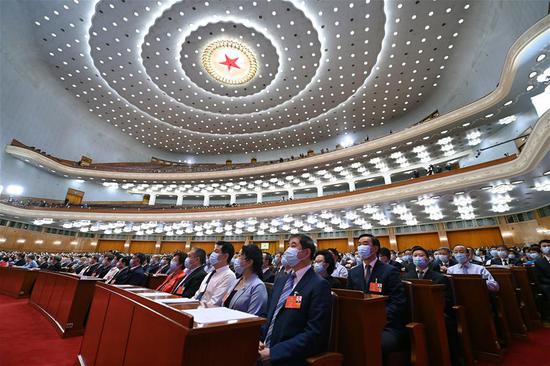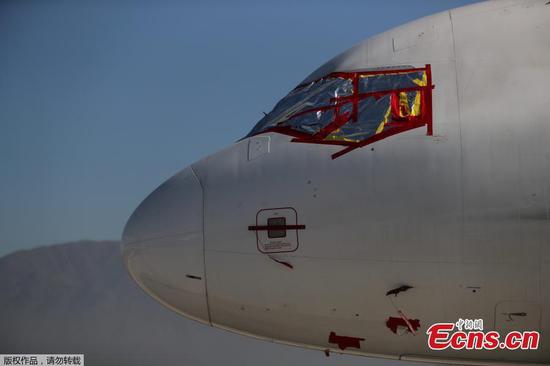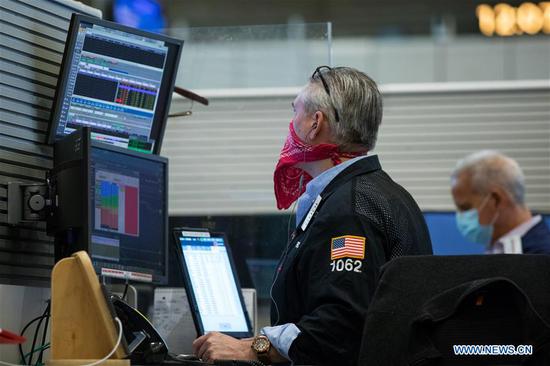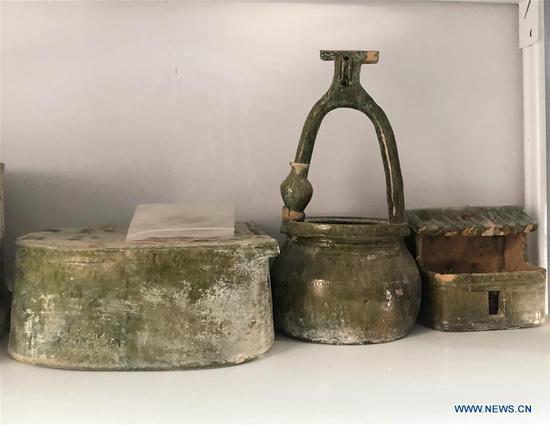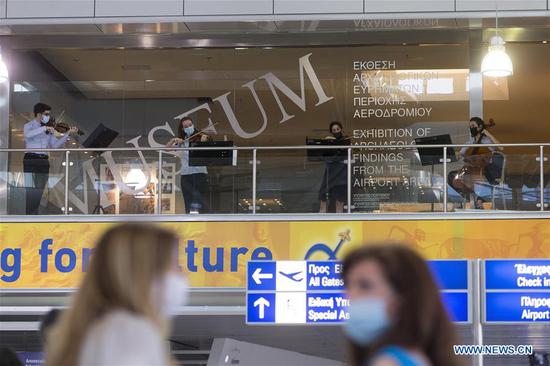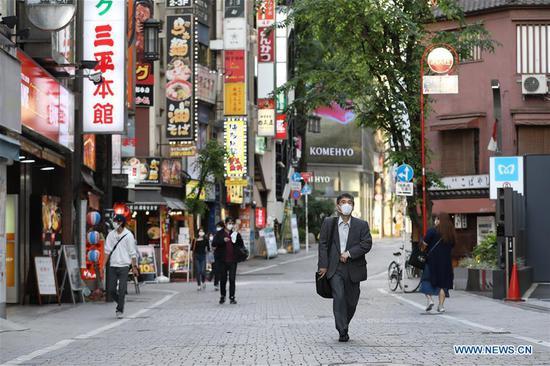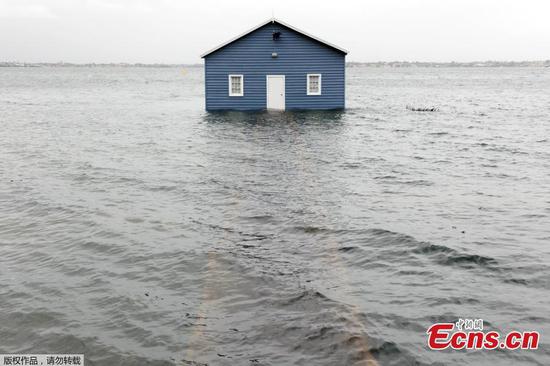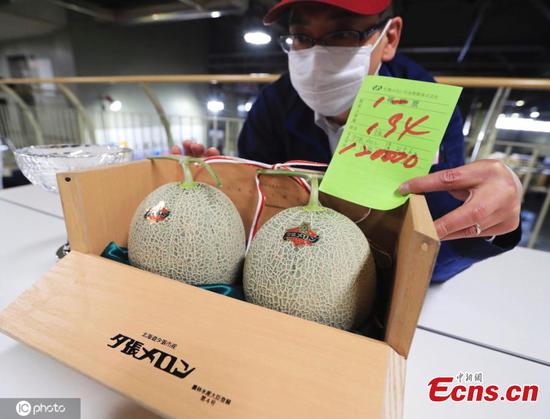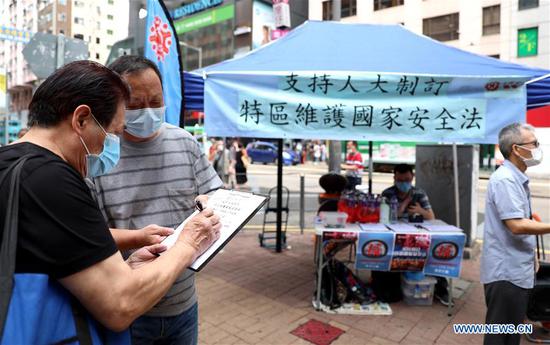
An online health consultancy platform resumes operations in March in Haidian district, Beijing. (Photo by Zou Hong/China Daily)
Fundraising a major challenge during pandemic
Startups in Asia face a battle for survival during the ongoing global economic downturn resulting from the COVID-19 pandemic.
Private market funding in Asia is expected to decline by 35 percent in the first quarter of this year, compared with the fourth quarter of last year, according to a report by technology research company CB Insights.
There has been a 16 percent fall in such funding worldwide-the second steepest quarterly decline in the past 10 years, following a 36 percent drop during the third quarter of 2012.
The decline appeared inevitable in view of the massive turbulence in global financial markets caused by the pandemic.
With one-third of the world's population forced to remain indoors, the International Monetary Fund has predicted that global growth will enter the deepest recession since the 1930s. With a projected growth rate of 3 percent, the world faces a far worse situation than during the 2008 global financial crisis.
Chibo Tang, a partner based in Hong Kong for venture capital company Gobi Partners China, one of the first Chinese venture capital companies to enter the Southeast Asian region, said fundraising is one of the biggest challenges Asian startups need to tackle during the pandemic.
"Based on the amount of funding and liquidity available being able to adapt to the new norms and also the new constraints faced by business, a lot of companies that were previously using fresh capital to expand into new markets to launch new products will need to adapt to changes in the business environment," Tang said.
"Most important, (startups need to) control and manage their own cash flow, so they can survive this period," Tang said, adding that this is mainly because many venture capital companies have become more cautious, especially with new investments.
"We began to see a shift in investor sentiment … even last year, but I think that COVID-19 has really accentuated that (outlook) even more," Tang said. He noted that consumer enterprises that became less sought after than deep technology companies in the second half of last year would tend to feel the shift in sentiment more acutely.
Tomas Laboutka, who launched the regional technology startups community SEA Founders, said loss of revenue is among the top concerns facing entrepreneurs in Southeast Asia, along with issues such as funding, costs and employees.
Although some startups might try to introduce measures to counter the impacts of COVID-19, loss of revenue will always be felt much more acutely than any increase in new revenue. Faced with this scenario, companies that have a longer cash conversion cycle and are short of cash because the top line suddenly disappears, face a bigger challenge, Laboutka said.

Ni Xinxin livestreams plant sales from his greenhouse in Feixi county, Anhui province. [Photo/Xinhua]
Many startups are attempting to prove that they have a market fit, but to remain on that path and sustain business growth, they require funding, Laboutka said. He added that unlike large and established companies with more stable cash flows, startups that have yet to turn a profit would be unable to survive without fresh funding.
Cong-Thang Huynh, co-founder of InnoLab Asia, an open innovation platform based in Vietnam, said only about one-third of the startups it is working with can survive the market turbulence.
InnoLab Asia is an implementation partner for Open Innovation Vietnam, a national initiative to build a startup and innovation ecosystem in the Southeast Asian country by 2025.
In addition, Huynh said some of the startups that worked with the platform in Vietnam last year, "do not respond to (our inquiries) now".Regional startups have begun to optimize their businesses and reconsider ongoing partnerships, he added.
Huynh said some events planned by InnoLab Asia have been affected by the pandemic. For example, the Vietnam Innovation Summit 2020, a technology gathering co-hosted by InnoLab and Vietnam's Ministry of Science and Technology, has been postponed from August to the first or second quarter of next year.
However, there is always a silver lining in any crisis. In Southeast Asia, leading venture capital companies such as 500 Startups are still making about one investment a week in the market, according to the company's general partner Vishal Harnal. Based in Singapore, he oversees investments in Southeast Asia.
Harnal said that while investors are now taking a more cautious approach, this sentiment is likely to change once the situation "becomes a new normal".
"Firms and investors will become more comfortable with COVID-19 and the opportunities that it presents. We will see firms gradually starting to pick up the pace of investment," he said.
Referring to market downturns caused by severe acute respiratory syndrome, or SARS, and the Zika virus, Harnal said that despite a dip in funding and a high casualty rate for startups, the "ecosystem "for them is expected to bounce back in 12 to 24 months after an outbreak ends.
"There are a few things that are quite interesting about Southeast Asia's (startup) ecosystem that make it a little different from others," Harnal said.
He added that many of the region's venture capital investors have not been through a recession, as this ecosystem only started to thrive in 2010 after the global financial crisis.
Meanwhile, a significant amount has been raised in venture capital funds. Harnal said, "Toward the end of March, there was close to $4 billion in dry powder sitting in Southeast Asian venture capital firms, which means that while the firms have never really navigated through a recession, everyone is sitting on a ton of capital right now that can be ready to deploy."
Dry powder is an industry term used to describe the amount of cash reserves or liquid assets available for investing in new opportunities. As of December, the global private equity industry's dry powder, including venture capital, reached a record-high $1.43 trillion, almost double the amount available five years ago, according to a report by alternative assets industry research company Preqin.

Luo Cuimei, right, promotes food produced by the Mulam ethnic group in Guangxi Zhuang autonomous region. [Photo/Xinhua]
Sharp rises
Noting a significant drop in new regional funding in February, Tang, from Gobi Partners, said the market needs to pay attention to the sharp rise in such funding in March, mainly due to the announcement of some mega deals that had been under discussion since late last year.
In China, startups and technology companies raised more than $2.5 billion in March as venture capital funding rebounded, rising sixfold from $410 million the previous month, according to the Financial Times, citing data from the Asian Venture Capital Journal.
Tang said, "To some degree, there will be a very quick pick up in the deployment of capital going into (the second quarter) of this year." He added that investment pace and strategies would continue to play out given the amount of cash reserves or liquid assets available.
"I don't think there will be a decline of any significant length going forward. Sentiment (over COVID-19) here in Asia is not as bad as most people would think, because in Asia-and we are seeing this in China especially-containment of the virus has actually been fairly successful," Tang said.
"The cities and the (regional) economy are starting to normalize. It's still going to take some time for things to really get back to the way they were last year, but there is definite progress there.
"Sentiment in China is pretty good. People are aware of the situation and it is clear that the government is doing everything it can to contain the impacts of the ongoing pandemic."
Laboutka, from SEA Founders, noting that it is important for governments to understand the needs of companies at different stages, said his organization is in talks with administrative bodies in Singapore and other countries to find a way to support startups.
"Startups by nature are very creative and have (a sense of) survival in their DNA, as they are trying not only to see how they can revive revenue, but also optimize the cost side without letting go of the most important assets," Laboutka said.
He added that startups are showing the world in many ways how to survive the health crisis, as many of these companies are used to working remotely.
Harnal, from 500 Startups, said that in view of the phenomenal growth among startups in fields such as online learning, online work collaboration tools, telemedicine, and grocery and food deliveries, it is important for investors to focus on such companies' long-term development. This includes the fundamental changes needed to sustain business growth as a result of the pandemic.

An online livestreaming service for shoppers is launched in Donghai county, Lianyungang, Jiangsu province. [Photo/Xinhua]
Record fundraising
In China, at the end of March, online education platform Yuanfudao announced its latest round of financing of $1 billion, the country's largest-ever fundraising in this sector.
Huynh, from InnoLab, said that the online learning platform Edu2Review in Vietnam has seen a surge in the number of users-a dramatic change, as it used to be difficult for it to attract customers.
It is good to see many startups adapting to the situation quickly, even though some may not be in sectors with high demand during the COVID-19 outbreak, Huynh said.
Startups in offline businesses or those affected by social distancing restrictions are also working to find innovative ways to maintain services, he added.
Harnal said it may be better for those startups that have to raise money after being badly affected by the pandemic to pause all business and use as few resources as possible.
In Singapore, an initiative called #SupportStartups was launched on April 1 by 500 Startups and other regional venture capital companies to support emerging regional businesses during the pandemic. Information about the promotional activities such companies are willing to offer is collated on a single website, with the aim of collectively increasing their public exposure and generating new business.
Harnal said there are plans to expand the initiative to other Southeast Asian countries, which will provide services in local languages to get more startups on board.











